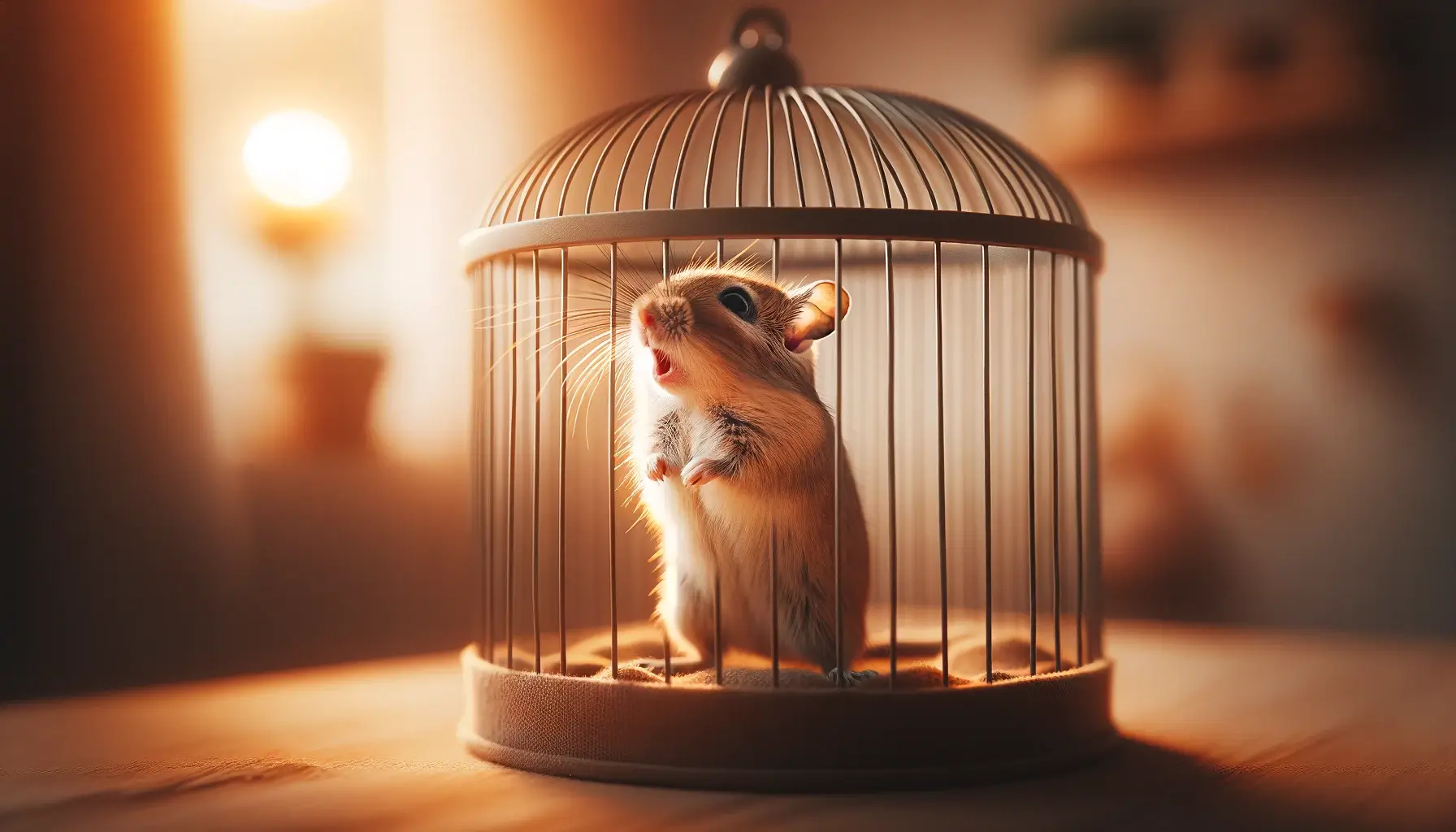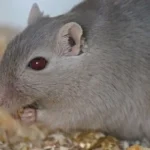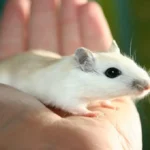Gerbils, with their playful antics and curious nature, have captured the hearts of pet lovers worldwide. These small, sociable rodents are not just fascinating to watch but also communicate in intriguing ways.
Among the various sounds they make, chirping stands out as a significant vocalization, often leaving gerbil owners curious about its meaning.
This article delves into the world of gerbil communication, focusing on the reasons behind their chirping and how to interpret these sounds.
By understanding what your gerbil is trying to convey, you can enhance your bond and ensure their well-being.
Understanding Gerbil Communication
Communication is vital in the animal kingdom, and gerbils are no exception. These desert rodents rely on a range of vocal sounds and body language to interact with each other and their human caretakers.
Chirping, squeaking, and thumping are just a few ways gerbils express their emotions, needs, and responses to their environment.
Recognizing and interpreting these signals is crucial for any gerbil owner who wants to provide the best care for their furry friend.
Chirping: A Key Vocalization
Chirping is a distinctive high-pitched sound that gerbils produce in various contexts. Unlike the more straightforward squeaks or thumps, chirping can convey a range of messages, from excitement and happiness to stress or a call for attention.
Learning to differentiate these chirps is essential for understanding your gerbil’s needs and emotional state.
Common Reasons: Why Is My Gerbil Chirping?

Gerbils chirp for several reasons, each with its own nuances. Here’s a closer look at why your gerbil might be chirping:
Seeking Attention
Gerbils are social creatures that thrive on interaction. A chirp can often be a simple request for your attention, signaling that your pet wants to play or be held. These chirps are usually short, light, and occur when you’re near their habitat.
Observing your gerbil’s body language, such as an eager look or movement towards you, can confirm their desire for interaction.
Expressing Happiness or Excitement
Chirping is also a sign of a happy and excited gerbil. When introduced to a new toy, exploring their cage, or engaging in play with a cage mate, gerbils may chirp joyfully. These sounds are typically more melodious and varied, reflecting their positive emotional state.
Watching your gerbil’s energetic behavior and enthusiastic chirping can be a delightful aspect of gerbil ownership.
Signaling Stress or Fear
Not all chirping is positive. Gerbils may chirp when they feel stressed, threatened, or scared. Loud, sharp chirps, especially when accompanied by attempts to hide or escape, indicate your gerbil is uncomfortable or frightened.
Common stressors include loud noises, sudden movements, or the presence of predators. Recognizing these signs of distress is crucial for providing a safe and comforting environment for your gerbil.
Indicating Pain or Discomfort
When gerbils chirp out of pain or discomfort, the sound is often sharp and persistent, serving as an immediate alert to their owners. This type of chirping is usually accompanied by other signs of distress or illness, such as lethargy, lack of appetite, or unusual behavior.
It’s crucial for gerbil owners to closely observe their pets for these additional symptoms, as they may indicate a range of health issues from minor injuries to more serious conditions requiring veterinary attention.
Understanding that chirping can be a call for help is essential in ensuring the timely care and well-being of your gerbil.
Communicating with Other Gerbils
Gerbils use chirping as a primary means of communication with each other, whether to establish social hierarchies, signal a willingness to play, or express discomfort or annoyance. In a group setting, chirping facilitates the complex social interactions that are vital to their communal living.
Observing how your gerbils chirp among themselves can offer fascinating insights into their social dynamics and help you ensure a harmonious living environment for your pets.
Marking Territory
While less common, some gerbils may use chirping in conjunction with scent marking to define their territory, especially in a new or rearranged cage. This behavior is more about establishing control and comfort within their environment rather than direct communication with their owners or cage mates.
Understanding this aspect of gerbil behavior can help owners minimize stress during cage cleanings or when introducing new elements to their habitat.
How to Respond to Gerbil Chirping?
Interpreting the various chirps of your gerbil is the first step in responding appropriately to their needs. For chirps that indicate happiness or a desire for attention, engaging with your pet through play or gentle handling can strengthen your bond.
Conversely, chirps that signal distress or pain require a more cautious approach, including creating a calm environment, checking for any signs of injury or illness, and consulting a veterinarian if necessary.
By tuning into the nuances of your gerbil’s chirps, you can become a more attentive and caring pet owner.
Enhancing Your Gerbil’s Well-being
Creating a Stimulating Environment
A stimulating environment is key to a gerbil’s happiness and health. Providing a variety of toys, tunnels, and opportunities for digging and climbing can keep your gerbil engaged and prevent boredom.
Regularly changing the layout of their cage and introducing new objects to explore can also help stimulate their natural curiosity and encourage physical activity, which is essential for their well-being.
Regular Health Checks
Regular health checks are crucial for catching any signs of distress or illness early on. Paying attention to changes in your gerbil’s behavior, appetite, and activity levels can help you identify potential health issues before they become serious.
Additionally, establishing a relationship with a veterinarian experienced in small rodents can ensure that your gerbil receives appropriate care and treatment when needed.
FAQs
Can gerbils chirp too much?
While gerbils are naturally communicative, excessive chirping, especially if it’s sharp or distressed, may indicate that something is amiss. This could be due to environmental stressors, health issues, or a need for more social interaction.
Monitoring your gerbil’s overall behavior and environment can help determine the cause of excessive chirping.
How can I tell if my gerbil’s chirping means it’s happy?
Happy chirps are usually accompanied by energetic behavior, such as playful jumping or running. These chirps tend to be softer and more melodious. Observing your gerbil’s body language and the context in which the chirping occurs can help you understand its mood.
Why is my gerbil chirping while sleeping?
Gerbils may chirp in their sleep due to dreaming or as a response to external noises. Just like humans, gerbils can have dreams that trigger physical responses, including chirping. It’s typically harmless, indicating your gerbil is in a deep sleep phase.
Why is my gerbil chirping at night?
Due to their crepuscular nature, gerbils are most active during dawn and twilight. Chirping at night could be a sign of their natural activity cycle. They might be communicating, playing, or expressing contentment during their peak hours of activity.
Why does my gerbil squeal whenever I pick it up?
A gerbil squeaking when picked up can indicate discomfort, fear, or surprise. Ensure you’re handling your gerbil gently and securely. Over time, as your gerbil becomes more accustomed to being handled, the squeaking should decrease as its comfort level increases.
Do gerbils chirp when they’re alone or only with other gerbils?
Gerbils may chirp both when they’re alone and when they’re with others. Solo chirping can be a sign of seeking attention from their human companions or expressing contentment. When with other gerbils, chirping is often part of their social interaction, used for communicating various messages.
Should I be worried if my gerbil suddenly stops chirping?
A sudden change in behavior, including a decrease in chirping, can be a sign of stress or illness. It’s important to observe your gerbil for other signs of distress or changes in behavior and consult a veterinarian if you have concerns about your pet’s health.
Conclusion
Understanding why your gerbil chirps is a fascinating journey into the world of these engaging pets. Chirping is a primary mode of communication for gerbils, used to express a wide range of emotions and needs, from happiness and excitement to stress and discomfort.
By paying close attention to the context and accompanying behaviors, gerbil owners can learn to interpret these vocalizations, enhancing the bond between them and their furry friends.











